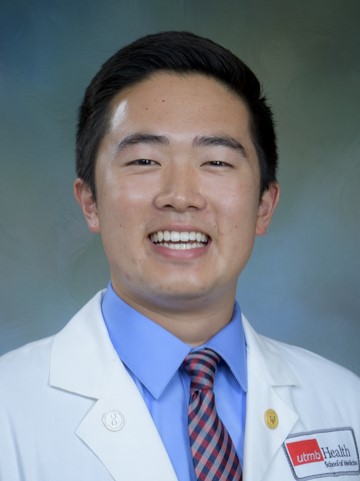Described as a passionate student fueled by genuine curiosity, Honors College alumnus Leonard Wang (2021) is a person who takes advantage of opportunities, seeks learning experiences and nurtures his personal and professional development for a successful future. After majoring in Honors Biomedical Sciences with a minor in Medicine & Society, Wang is now pursuing a Doctor of Medicine/Master of Public Health dual degree program and a Master of Business Administration at The University of Texas Medical Branch.
Wang began his career at the University of Houston by getting accepted into both the Honors College and the 3/4 Accelerated B.S./M.D. Program that offered conditional acceptance into McGovern Medical School or UTMB. “This program offered the most financially feasible route to become a physician,” said Wang. Within his first year, he was one of 12 recipients of the Honors College Outstanding First Year Student Award and soon became a Houston Scholar.
“The Houston Scholars program provided a platform for me to advance my academic and professional growth at UH,” said Wang. The program placed Wang in a diverse cohort of students with views that challenged each other’s beliefs which lead to a more holistic understanding of global problems and solutions. “For one research project with Houston Scholars, I partnered with a student studying theatre at UH to analyze food deserts within Houston and develop extensive policy proposals to mitigate the lack of food security within Third Ward. This early exposure to public health policy is one of the reasons I decided to pursue a M.D./MPH dual degree program at UTMB.”
Through the Houston Scholars program coupled with strong relations between Medicine & Society and the UH College of Medicine, Wang was able to receive seed funding for his internship with the Patient Care Intervention Center (PCIC), a local nonprofit dedicated to improving health outcomes for underserved populations. “My Medicine & Society courses with Dr. Helen Valier — one of my most influential mentors at UH — taught me about disparities in health care, systems theory and interprofessionalism. The internship with PCIC provided me an opportunity to apply what I learned in the classroom to the real world,” emphasized Wang. Under the mentorship of Professor David Buck, Wang worked with PCIC to address social determinants of health adversely impacting patients at a Federally Qualified Health Center in Houston.
“It’s been a privilege to come to know Leonard well as his professor and academic mentor, and his skills in both math and science and humanities and writing have made it a delight for me,” expressed Valier. “It is tremendously satisfying to be able to coordinate the many resources of UH, the Honors College and the city of Houston in ways that center student success and development just as it is satisfying and more to have opportunities to assist remarkable, outstanding students and human beings like Leonard Wang.”
In the Honors College, Wang also discovered a passion for writing as he began extending it to the medical humanities through his medicine and society courses. This led him to FrameWorks, a program dedicated to elevating undergraduate critical inquiry in the interdisciplinary humanities through mentorship and peer-support. For his 2020-21 FrameWorks fellowship, he was able to conduct research “to publish a longform critical essay that examines the COVID-19 pandemic as a sociocultural phenomenon under the mentorship of Dr. Helen Valier and the editorship of Dr. Max Rayneard,” explained Wang. His manuscript, “The Reframing of the COVID-19 Pandemic: Material Culture, Ontological Security, and Liminality,” has now been accepted for publication in an upcoming issue of FrameWorks: A Journal of Undergraduate Research in the Interdisciplinary Humanities.
As Wang continues to pursue his career at UTMB, he envisions himself “as a leading professional in providing affordable and quality health care to socioeconomically disadvantaged people, especially the underinsured and uninsured,” Wang says. “As a physician, I aspire to lead community-based interventions and policy reform to advance quality health services for marginalized communities and alleviate structural causes of health inequities.”
“He’s going to make a phenomenal physician. When speaking to him, he truly cares about people,” highlighted UH alum Adrian Castillo. “He wants to educate people instead of just treating people because education is part of the treatment — education is preventative treatment.”
“My lifelong ambition is to advocate and fight for the health of my patients,” said Wang. Wang’s curiosity and ingenuity, combined with his disciplined work ethic, is leading him to new heights as he strives towards making a more positive change in health care. “I’m extremely grateful for Dr. Ben Rayder and the Office of Undergraduate Research and Major Awards for supporting me in my pursuit of a holistic education and co-curricular experiences that will benefit my future clinical practice.”
